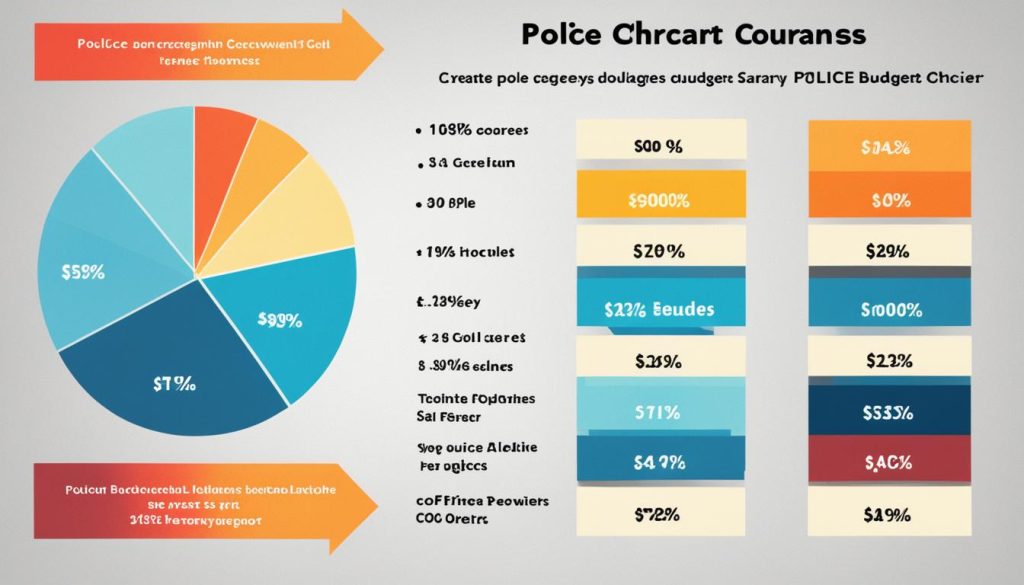Greetings, fellow Canadians! Today, I want to shed some light on an important topic that often sparks curiosity: police officer salaries. Many people wonder, “How much do police officers make?” and are keen to understand the intricacies of law enforcement wages. In this article, we’ll explore the average police officer income, the police compensation structure, and the factors that influence police pay scales.
Recently, Montreal’s executive committee approved a new contract for the city’s police force, which includes some noteworthy changes. One of the key provisions is a general wage increase of 2 to 2.5 percent, aimed at ensuring fair compensation for our brave officers. Moreover, the contract includes bonuses such as the “metropolis bonus” and the “patrol bonus,” ranging from 7.5 to 15 percent and 2 percent, respectively. Additionally, the starting salary for auxiliary constables and cadets has been raised.
Key Takeaways:
- Police officer salaries are a topic of curiosity for many Canadians.
- Montreal’s new police contract includes wage bumps and bonuses to retain staff.
- Auxiliary constables and cadets will benefit from an increased starting salary.
- The “metropolis bonus” and “patrol bonus” are part of the revised compensation structure.
- The average police officer income varies based on factors such as experience and rank.
Knowing the ins and outs of police officer salaries is crucial for both potential recruits and those interested in understanding law enforcement earnings. It enables us to appreciate the dedication and sacrifices made by our brave men and women in uniform. In the following sections, we’ll delve deeper into factors that influence police salaries and explore their comparison with other budget allocations. Stay tuned for more insightful revelations!
Factors Affecting Police Salaries
The wage increase for police officers in Montreal is attributed to several factors that aim to address staffing issues and retain experienced personnel within the force. In recent years, the Montreal Police Brotherhood has reported a record number of resignations and an increase in officers seeking employee assistance. Stress and overwork have been identified as significant contributors to these challenges, resulting in a need for decisive action to support the well-being of officers.
Under the new contract, various provisions have been introduced to tackle these issues. One such provision is the hiring of retired officers, allowing for the utilization of their experience and knowledge. Additionally, a new neighborhood foot patrol initiative has been introduced to increase community engagement and address localized concerns. These measures aim to provide a more balanced workload for officers and improve interaction between police and community members.
Mayor Valerie Plante has emphasized the importance of retaining the city’s police force and ensuring its attractiveness to both current officers and potential recruits. The wage increase, along with other provisions in the contract, serve as a tangible demonstration of the commitment to address staffing concerns and enhance the overall work environment for police officers in Montreal.

| Factors Affecting Police Salaries | Description |
|---|---|
| Staffing Challenges | A record number of resignations and increased officer assistance requests due to stress and overwork. |
| Retired Officer Hiring | Utilizing the experience and knowledge of retired officers to support the force. |
| Neighborhood Foot Patrols | Introducing foot patrols to enhance community engagement and tackle localized concerns. |
| Attractiveness for Officers | Mayor’s commitment to retaining experienced personnel and creating a positive work environment. |
Comparison of Police Budgets and Salaries
In 2021, the Montreal Police budget received a significant increase in funding, totaling $15 million. This substantial allocation accounts for 11 percent of the city’s total budget, reflecting the importance placed on law enforcement. The bulk of this budget is dedicated to the salaries of police officers, with an impressive $548 million specifically allocated for this purpose.
It is worth noting that the salary of Police Chief Sylvain Caron stands at $252,000, surpassing the salary of Mayor Plante, which is $196,000. The relative prominence of the Police Chief’s salary is a testament to the significance of this leadership position within the department.
In addition to police officer salaries, the Montreal Police Department also has a significant number of civilian workers. Salaries for these civilian employees amount to an additional $107 million. Collectively, the salaries of both police officers and civilian workers comprise a staggering total of $655 million within the Service de police de la Ville de Montréal (SPVM).

This image visually captures the allocation of the police budget, emphasizing the substantial investment in police salaries.
Examining the breakdown of the police budget and salaries showcases the commitment of the city of Montreal to adequately compensate and support its police force. The allocation of such a significant budget highlights the importance placed on public safety and maintaining a strong and effective police presence within the city.
Challenges and Benefits of Civilianization in Policing
The civilianization of police, which involves employing civilians in various roles within law enforcement agencies, offers several benefits and challenges in optimizing police services and resources.
Benefits of Civilian Employees
- Civilianization brings potential cost savings to police services. Civilian employees typically receive lower salaries compared to sworn officers, which can result in budget efficiency.
- Civilians possess specialized expertise in areas such as administration, technical support, investigations, and more. Leveraging their skills allows for efficient execution of non-frontline tasks, enabling sworn officers to focus on their essential duties in the field.
- By utilizing civilians in police departments, agencies can diversify their workforce and foster a more inclusive environment.
Challenges of Civilianization
- Maintaining morale among both sworn officers and civilian employees is crucial. Policymakers must ensure that the contributions of civilians are valued and recognized, fostering a collaborative and supportive work culture.
- Employee turnover may pose a challenge in civilianization efforts. Retention strategies and career development opportunities can help address this issue and ensure a stable workforce.
- There may be reluctance among police executives and associations to reduce the number of sworn officers in favor of civilians. Overcoming resistance and promoting the advantages of civilian employees require effective communication and partnerships.
While challenges exist, the benefits of civilianization in policing, including cost savings, specialized expertise, and improved frontline service delivery, make it a valuable strategy for optimizing police services and resources.
Future Research on Civilianization and Police Salaries
As the civilianization of police services gains traction in Canada, further research is necessary to fully assess the economic benefits and non-economic costs associated with this approach. While employing civilian staff in various roles may offer potential cost savings compared to sworn officers, it is important to consider the overall costs of policing. The continued hiring of sworn officers may limit the extent to which civilianization leads to significant decreases in police personnel costs.
One of the major challenges in implementing civilianization is the reluctance to reduce the number of sworn officers. Police executives and associations often prioritize maintaining a certain level of sworn personnel, which can inhibit the full realization of the benefits of civilianization. Future studies should therefore explore strategies to overcome this barrier and promote the effective integration of civilian staff within police departments.
Future research on civilianization should also delve into the broader impacts of this approach. Evaluating the influence of civilianization on crime prevention strategies, employee productivity, job satisfaction, and morale will provide valuable insights. By understanding these factors, police departments can make informed decisions about the optimal allocation of personnel and resources.